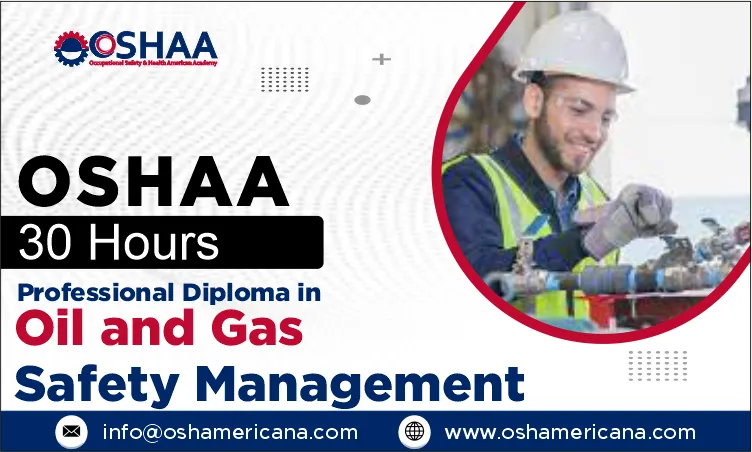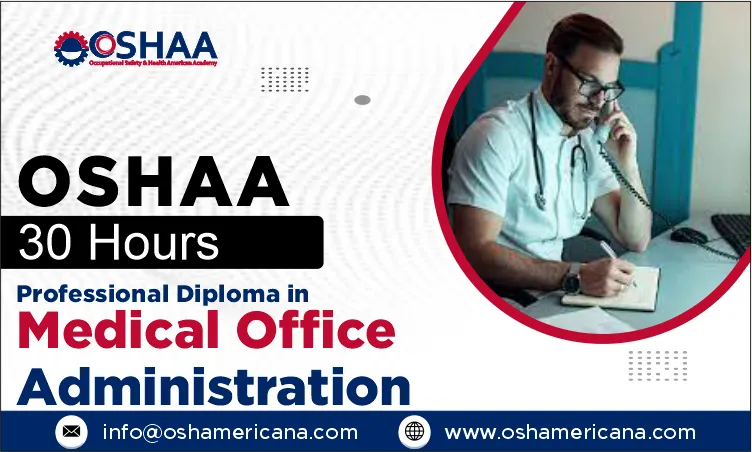Earn the OSHAA 30-Hours Professional Diploma in Oil and Gas Safety Management and gain the expertise to ensure compliance, reduce risks, and advance your career.
The oil and gas industry is recognized as one of the most complex and high-risk sectors in the world, where health and safety are of paramount importance. Workers are often exposed to hazardous materials, volatile environments, and extreme working conditions that demand a strong foundation in safety management. The OSHAA 30-Hours Professional Diploma in Oil and Gas Safety Management has been designed to provide professionals with the essential knowledge, regulatory understanding, and practical skills required to manage safety effectively in this challenging field.
This comprehensive diploma emphasizes the importance of compliance with international safety standards and equips learners with the ability to identify, assess, and mitigate workplace risks. By enrolling in the OSHAA 30-Hours Professional Diploma in Oil and Gas Safety Management, participants will gain a deeper understanding of safety management systems, industry-specific regulations, and the strategies needed to foster a proactive safety culture. The program not only enhances technical expertise but also builds the confidence to implement safety protocols that protect both workers and operations.
In high-risk industries such as oil and gas, safety is not optional—it is a critical component of operational success. This diploma ensures that professionals are prepared to address the unique challenges of the sector, from managing hazardous materials to ensuring compliance with occupational health and safety regulations. The OSHAA 30-Hours Professional Diploma in Oil and Gas Safety Management provides the tools to create safer workplaces, reduce incidents, and promote long-term sustainability in operations.
Completing this program offers significant career advantages, as it demonstrates a strong commitment to professional development and workplace safety. Graduates of the OSHAA 30-Hours Professional Diploma in Oil and Gas Safety Management are well-positioned to take on leadership roles in safety management, ensuring that their organizations meet regulatory requirements while maintaining productivity and efficiency. Whether you are seeking to advance your career, strengthen your expertise, or ensure that your workplace adheres to the highest safety standards, this diploma delivers the knowledge and skills necessary to succeed in the oil and gas industry.
By mastering the principles taught in the OSHAA 30-Hours Professional Diploma in Oil and Gas Safety Management, professionals will be empowered to make a lasting impact on workplace safety, compliance, and operational excellence. This program is not just a qualification—it is a vital step toward building a safer, more responsible, and more successful future in the oil and gas sector.
OSHAA 30-Hours Professional Diploma in Oil and Gas Safety Management
To enroll in the OSHAA 30-Hours Professional Diploma in Oil and Gas Safety Management, learners are expected to meet the following criteria:
- Age Requirement
- Applicants must be at least 18 years of age to register for the OSHAA 30-Hours Professional Diploma in Oil and Gas Safety Management. This minimum age requirement ensures that learners possess the maturity and responsibility needed to engage with advanced safety management concepts and apply them effectively in professional oil and gas environments.
- Educational Background
- A high school diploma or equivalent qualification is recommended as the minimum educational requirement for enrolling in the OSHAA 30-Hours Professional Diploma in Oil and Gas Safety Management. While this baseline ensures learners can grasp the technical and regulatory aspects of the program, individuals with higher education in engineering, occupational health and safety, environmental sciences, or related fields will find the course particularly advantageous. Advanced academic preparation can enhance comprehension of complex safety systems, compliance frameworks, and industry-specific risk management strategies.
- Work Experience
- Prior work experience in the oil and gas sector, construction, or industrial safety is not mandatory for admission into the OSHAA 30-Hours Professional Diploma in Oil and Gas Safety Management. However, having professional exposure to high-risk industries is highly beneficial, as it allows learners to contextualize the training within real-world operations. Professionals already working in safety management, drilling operations, or refinery environments will gain immediate practical value, while newcomers will acquire a strong foundation to pursue career opportunities in occupational health and safety within the oil and gas industry.
- English Proficiency
- Since the OSHAA 30-Hours Professional Diploma in Oil and Gas Safety Management is delivered in English, learners must be able to read, write, and communicate effectively in the language. Proficiency in English is essential for understanding technical course materials, interpreting international safety regulations, and applying compliance standards in professional practice. Strong language skills also ensure that participants can engage confidently with safety documentation, regulatory guidelines, and workplace communication in global oil and gas operations.
Meeting these eligibility requirements ensures that learners are fully prepared to benefit from the OSHAA 30-Hours Professional Diploma in Oil and Gas Safety Management. By aligning with these standards, participants can maximize their learning outcomes, strengthen their professional credentials, and position themselves for success in the demanding field of oil and gas safety management. This program not only enhances individual expertise but also contributes to building safer, more compliant, and more efficient workplaces across the global energy sector.
Study Units
Learning Outcomes
Introduction to Oil and Gas Safety Management (3 Hours)
- Understand the fundamental concepts of safety management in the oil and gas industry.
- Identify common hazards and safety concerns associated with oil and gas operations.
- Learn the importance of safety culture and its impact on operational efficiency and worker wellbeing.
- Gain insight into the key elements that form a safety management system in oil and gas.
Oil and Gas Safety Regulations and Legal Framework (4 Hours)
- Understand the key safety regulations and legal requirements governing the oil and gas industry.
- Familiarise with industry standards and codes of practice for health and safety compliance.
- Learn the role of government agencies, regulatory bodies, and compliance monitoring in ensuring safety.
- Understand the legal responsibilities of employers and employees in the oil and gas sector.
Hazard Identification and Risk Assessment in Oil and Gas Operations (4 Hours)
- Learn methods for identifying potential hazards in oil and gas environments.
- Understand the process of conducting thorough risk assessments to mitigate operational risks.
- Gain skills in evaluating and prioritising risks based on their likelihood and severity.
- Understand how to implement control measures to minimise hazards and risks in the workplace.
Safety Management Systems (SMS) in Oil and Gas (6 Hours)
- Understand the core components and principles of safety management systems (SMS) in the oil and gas industry.
- Learn how to design, implement, and monitor SMS to ensure continuous improvement in safety practices.
- Understand the relationship between SMS, safety culture, and incident prevention.
- Gain the skills to conduct audits and inspections to evaluate the effectiveness of safety management systems.
Emergency Response and Crisis Management in Oil and Gas (4 Hours)
- Learn the fundamental principles of emergency response in oil and gas operations.
- Understand the steps involved in developing and implementing an emergency response plan.
- Gain insight into crisis management strategies to effectively handle incidents such as oil spills, fires, and explosions.
- Understand the importance of training and simulations in preparing for emergency situations.
Workplace Safety Culture in the Oil and Gas Industry (4 Hours)
- Understand the role of workplace safety culture in reducing accidents and improving overall safety performance.
- Learn strategies to promote a positive safety culture within teams and organisations.
- Identify ways to engage employees in safety initiatives and encourage personal responsibility for safety.
- Understand the barriers to safety culture and how to overcome them in an oil and gas setting.
Personal Protective Equipment (PPE) and Safe Work Practices (5 Hours)
- Learn the types of personal protective equipment (PPE) required for various oil and gas operations.
- Understand how to assess and select the appropriate PPE based on the specific hazards present.
- Gain knowledge of safe work practices and how to implement them in daily operations.
- Learn how to train employees on the proper use and maintenance of PPE to ensure maximum safety.
The OSHAA 30-Hours Professional Diploma in Oil and Gas Safety Management provides a wide range of benefits designed to strengthen professional expertise, enhance organizational safety standards, and ensure compliance with global regulations. This program is highly relevant for industry professionals, organizations, and stakeholders who operate in one of the most high-risk sectors worldwide. By completing this diploma, learners not only gain advanced knowledge of occupational health and safety but also position themselves as valuable assets in promoting compliance, reducing workplace incidents, and driving operational excellence. The course is globally recognized, making it an essential qualification for professionals seeking career advancement, organizational growth, and long-term sustainability in the oil and gas industry.
- Comprehensive Knowledge of Safety Management
- Learners gain in-depth knowledge of safety management systems tailored to the oil and gas sector. This includes understanding hazard identification, risk assessment, and the implementation of preventive measures that directly improve workplace safety.
- Regulatory Compliance and Legal Protection
- The OSHAA 30-Hours Professional Diploma in Oil and Gas Safety Management ensures that participants are well-versed in international safety regulations and compliance standards. This knowledge helps organizations avoid costly penalties, legal liabilities, and reputational damage.
- Enhanced Workplace Safety
- By applying the principles learned in this diploma, professionals can significantly reduce workplace accidents and incidents. This leads to safer operations, improved worker confidence, and a stronger safety culture across the organization.
- Career Advancement Opportunities
- Completing the OSHAA 30-Hours Professional Diploma in Oil and Gas Safety Management enhances professional credibility and opens doors to senior roles in safety management, compliance, and leadership within the oil and gas industry.
- Operational Efficiency and Cost Savings
- Effective safety management reduces downtime, equipment damage, and compensation claims. The OSHAA 30-Hours Professional Diploma in Oil and Gas Safety Management diploma equips learners with the skills to implement cost-saving strategies while maintaining high safety standards.
- Leadership and Communication Skills
- The OSHAA 30-Hours Professional Diploma in Oil and Gas Safety Management program emphasizes leadership in safety management, enabling professionals to communicate effectively, influence teams, and foster a culture of accountability and responsibility in high-risk environments.
- Improved Worker Well-being and Productivity
- A safe workplace directly contributes to employee well-being and higher productivity. The OSHAA 30-Hours Professional Diploma in Oil and Gas Safety Management empowers professionals to create environments where workers feel protected and motivated.
- Emergency Preparedness and Crisis Management
- Participants develop the ability to design and implement emergency response plans, ensuring readiness for incidents such as fires, explosions, or chemical spills. This preparedness minimizes risks and protects both lives and assets.
- Global Recognition and Industry Relevance
- The diploma is internationally recognized, making it a valuable credential for professionals seeking opportunities in global oil and gas markets. It demonstrates expertise in safety management that aligns with international best practices.
- Continuous Professional Development
- The OSHAA 30-Hours Professional Diploma in Oil and Gas Safety Management supports lifelong learning by keeping professionals updated with evolving safety standards, technological advancements, and industry innovations.
- Risk Management Expertise
- Learners acquire advanced skills in identifying, analyzing, and mitigating risks specific to oil and gas operations. This expertise ensures safer project execution and long-term operational stability.
- Strengthened Organizational Reputation
- Companies that employ professionals with this diploma demonstrate a strong commitment to safety and compliance, enhancing their reputation with clients, regulators, and stakeholders.
- Innovation in Safety Practices
- The program encourages continuous improvement and innovation in safety management, equipping professionals to adopt new technologies and strategies that enhance workplace safety.
- Cross-Industry Applicability
- While focused on oil and gas, the skills gained from the OSHAA 30-Hours Professional Diploma in Oil and Gas Safety Management are transferable to other high-risk industries, broadening career opportunities for graduates.
- Contribution to Sustainable Operations
- By promoting safety, compliance, and efficiency, this diploma supports sustainable business practices that protect both people and the environment, aligning with global sustainability goals.
The OSHAA 30-Hours Professional Diploma in Oil and Gas Safety Management is more than a qualification—it is a strategic investment in professional growth, organizational resilience, and global safety standards. By completing this program, learners not only advance their careers but also contribute to building safer, more compliant, and more productive workplaces in the oil and gas industry.
The OSHAA 30-Hours Professional Diploma in Oil and Gas Safety Management is designed for professionals, organizations, and stakeholders who are committed to advancing workplace safety, ensuring OSHA compliance, and strengthening operational efficiency in one of the world’s most high-risk industries. This globally recognized program is relevant for individuals at all levels of oil and gas operations, from frontline supervisors to senior executives, as well as for companies seeking to enhance their safety culture, reduce incidents, and meet international regulatory standards. By addressing the unique challenges of the oil and gas sector, the diploma provides essential professional development opportunities that empower participants to lead with confidence and expertise in safety management.
- Safety Managers
- Responsible for overseeing workplace safety programs and ensuring compliance with OSHA standards.
- This course equips them with advanced knowledge of safety management systems tailored to oil and gas operations.
- They gain the ability to implement proactive safety measures that reduce risks and incidents.
- The diploma strengthens their role in ensuring regulatory compliance and fostering a culture of safety excellence.
- Operations Supervisors
- Oversee daily oil and gas operations, including drilling, refining, and production activities.
- The OSHAA 30-Hours Professional Diploma in Oil and Gas Safety Management course provides them with tools to integrate safety protocols into operational workflows.
- They learn to identify hazards, enforce compliance, and improve team safety performance.
- This training enhances operational efficiency while ensuring adherence to OSHA safety requirements.
- HSE Officers (Health, Safety, and Environment Officers)
- Play a critical role in monitoring and enforcing workplace safety standards.
- The diploma enhances their ability to conduct risk assessments and safety audits effectively.
- They gain deeper insights into OSHA compliance and international safety regulations.
- This course strengthens their capacity to protect workers, assets, and the environment.
- Engineers and Technical Staff
- Involved in designing, maintaining, and operating oil and gas infrastructure.
- The OSHAA 30-Hours Professional Diploma in Oil and Gas Safety Management program helps them understand how engineering decisions impact workplace safety.
- They acquire skills to integrate safety considerations into technical processes.
- This ensures compliance with OSHA standards while improving reliability and efficiency.
- Project Managers
- Responsible for planning and executing large-scale oil and gas projects.
- The diploma equips them with strategies to manage safety risks across project lifecycles.
- They learn to balance productivity with compliance and worker protection.
- This training supports OSHA-aligned project execution and sustainable outcomes.
- Contractors and Subcontractors
- Frequently engaged in high-risk oil and gas operations such as drilling and construction.
- The OSHAA 30-Hours Professional Diploma in Oil and Gas Safety Management course ensures they understand and comply with OSHA safety requirements.
- They gain the ability to align their practices with client safety expectations.
- This enhances their credibility and reduces liability in contractual engagements.
- Oil and Gas Executives
- Senior leaders responsible for organizational strategy and compliance.
- The diploma provides them with insights into global safety standards and OSHA regulations.
- They learn how strong safety management drives operational excellence and reputation.
- This training supports executive decision-making that prioritizes safety and compliance.
- Regulatory and Compliance Officers
- Ensure that organizations meet local and international safety regulations.
- The OSHAA 30-Hours Professional Diploma in Oil and Gas Safety Management course deepens their understanding of OSHA compliance frameworks.
- They gain the ability to monitor, evaluate, and enforce safety standards effectively.
- This enhances organizational resilience and reduces regulatory risks.
- Training and Development Professionals
- Responsible for designing and delivering workforce training programs.
- The diploma equips them with updated knowledge of OSHA-aligned safety practices.
- They can develop effective training modules that improve worker safety awareness.
- This ensures continuous professional development and compliance across the workforce.
- Aspiring Oil and Gas Professionals
- Individuals seeking to enter the oil and gas industry with a strong safety foundation.
- The OSHAA 30-Hours Professional Diploma in Oil and Gas Safety Management course provides them with essential knowledge of workplace safety standards.
- They gain a competitive advantage in securing roles within high-risk industries.
- This qualification demonstrates commitment to OSHA compliance and professional growth.
The OSHAA 30-Hours Professional Diploma in Oil and Gas Safety Management equips participants across all roles with advanced knowledge, practical skills, and globally recognized certification. By completing this program, professionals enhance their ability to ensure OSHA compliance, reduce workplace risks, and drive operational excellence. Whether for safety managers, engineers, executives, or aspiring professionals, this diploma serves as a vital credential that strengthens careers, supports organizational success, and contributes to building safer, more sustainable oil and gas operations worldwide.







